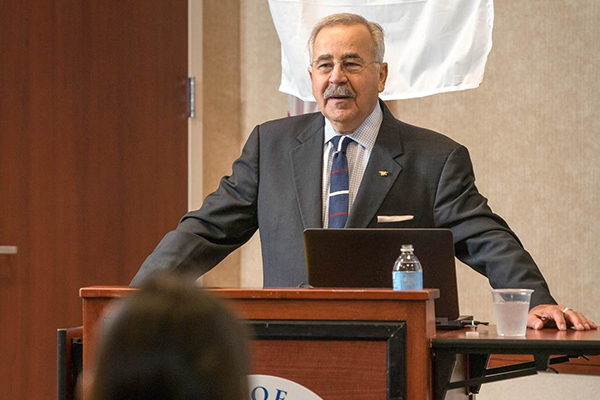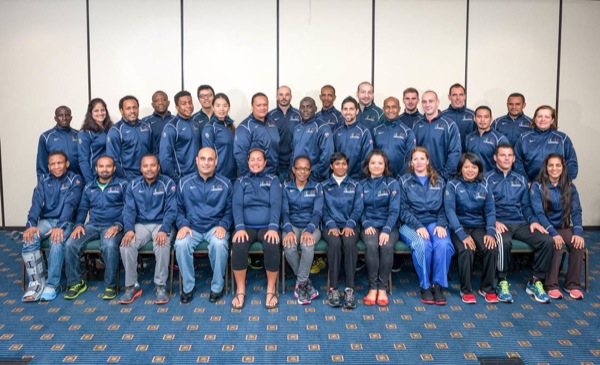


ICECP seventh annual opening ceremony
Coaches from around the world participate in Olympic enrichment program
2:45 p.m., Sept. 29, 2014--The U.S. Olympic Committee (USOC), the University of Delaware and the International Olympic Committee’s (IOC) Olympic Solidarity department are partnering for the seventh edition of the International Coaching Enrichment Certification Program (ICECP), welcoming 32 national coaches representing five continents, 32 countries and 15 sports.
The program began at UD on Sept. 22 and will run until the final module concludes April 28, 2015, at the IOC headquarters in Lausanne, Switzerland.
Global Stories
Fulbright awards
Peace Corps plans
“In continuing our partnership with the IOC and the University of Delaware, we are able to help deliver a program that has a lasting impact on sport around the globe,” said USOC CEO Scott Blackmun. “We are proud to be involved with the ICECP, which provides resources to countries that are working to develop strong sport infrastructures.”
In its seven years the ICECP has hosted 165 coaches from 82 countries and 23 sports.
The program consists of lectures, guest speakers, participant presentations, group work and field trips. Topics include sport nutrition, sport medicine, injury management and prevention, sport psychology and physiology, sport administration, and coaching methods.
The following 33 countries will be represented in the seventh edition of the ICECP: Colombia, Ethiopia, Suriname, Maldives, Latvia, Antigua, Grenada, St. Vincent, India, Qatar, Syria, Fiji, Botswana, Trinidad Tobago, El Salvador, Dominica, Jordan, Serbia, Cape Verde, Cayman Islands, Brazil, China, Uganda, Mozambique, Malaysia, Cook Islands, Puerto Rico, United States, Nigeria, American Samoa, Macedonia, Austria and Cambodia.
The program has four modules. In the first, participants spend two weeks at UD attending lectures and presentations from experts on a variety of coaching education and sports science topics from Sept. 20 to Oct. 5.
The keynote speaker at the ICECP opening ceremony on Sept. 22 was Hank Steinbrecher, former secretary general of U.S. Soccer. Steinbrecher had a leadership role in the U.S. hosting of the 1994 Men’s FIFA World Cup and 1999 FIFA Women’s World Cup and was instrumental in the launching of Major League Soccer (MLS).
“Coaches have the power to change the world,” Steinbrecher told the participants. “To solve many of the world’s problems, we have to get the kid right. Who besides a parent has more influence with kids than a coach?”
Steinbrecher added, “Sport is a universal language that unites rather than divides. I have seen it first-hand. I have seen Iran and Iraq play a soccer match even though they were at war at the time.I saw Japan and South Korea work together to host the 2002 FIFA World Cup.”
Steinbrecher challenged the coaches to return home and to make a difference in their countries through sport and encouraged them to collaborate with their international colleagues. In doing, he said, so there will be more understanding and less conflict.
The second module will take place from Oct. 5-12 and is a sport-specific apprenticeship that allows participants to observe and interact with coaches from National Governing Bodies (NGBs), university athletic teams or elite sport clubs in each of their respective sports.
Apprenticeship sites include archery at the U.S. Olympic Training Center in Chula Vista; athletics at Penn State University; boxing at The Corner Boxing Club in Boulder Colorado; canoeing at the Lake Lanier Olympic Venue in Gainesville, Georgia; fencing at PDX Fencing in Portland, Oregon; futebol at YSC Training Facility in King of Prussia, Pennsylvania; rowing and volleyball at Princeton University; basketball at Penn State University, Rider University and the Competitive Edge Basketball Program in Philadelphia; swimming at North Baltimore Aquatic Club; table tennis at the Austin Table Tennis Club; taekwondo in Virginia; and weightlifting, wrestling and judo at the U.S. Olympic Training Center in Colorado Springs.
The third module will take place from Oct. 12-24 at the U.S. Olympic Training Center in Colorado Springs and consists of a continuation of lectures and group work activities during a two-week period taught by USOC sport performance and coaching experts.
In the final module, participants will present the projects they completed over the course of the program to the ICECP Academic Board, and again to their peers, at the IOC headquarters in Lausanne from April 23-28. The projects will focus on improving sport in their home countries in the areas of athlete development, coach education and development and training methodology.
“The University of Delaware supports the high ideals of the Olympic Movement and is pleased to offer a well-structured, comprehensive and in-depth course of study,” said Bruce Weber, dean of the Alfred Lerner College of Business and Economics who provided the University welcoming. “We are proud and excited about hosting this year’s class of ICECP participants and thank the United States Olympic Committee and the Olympic Solidarity program for this incredible opportunity.”
The program is headed at the University by UD sport management professor Matthew Robinson and Jeff Schneider, instructor in the Department of Kinesiology and Applied Physiology.
“We are looking to build on the success of our last six years,” Robinson said. “Because of the efforts of the participants and so many who contribute to the program, the ICECP has become respected globally as a leading coach development program. The true value of the program is what past participants have done when they have returned to their countries. The projects that have been implanted have truly being amazing in regards to their impact on athletes and coaches in those countries. We know this group will continue in the tradition that has been set by past classes.”
The aim of Olympic Solidarity is to organize assistance to National Olympic Committees (NOCs), particularly those with the greatest need for help. Assistance is a joint effort between the IOC and the NOCs, along with technical help from the International Federations, if necessary.
For more information about ICECP, to view program photos or to read blog entries from the 2008-13 programs, visit the website.









